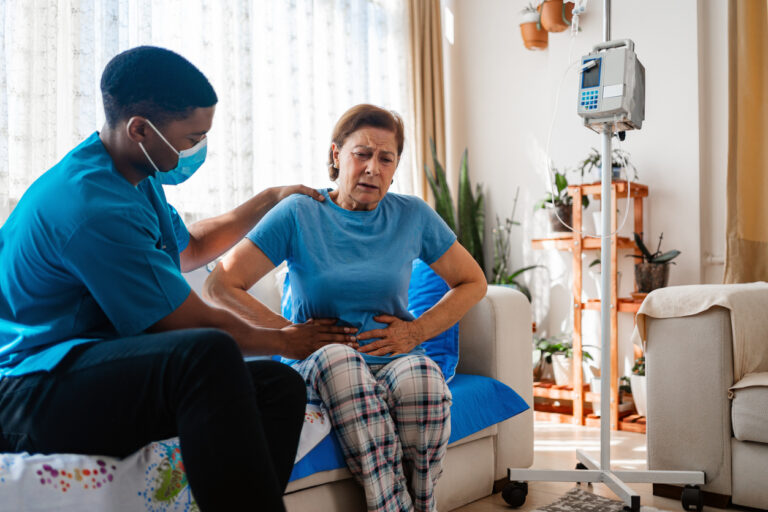by TIM SMITH
We all know the best way of tackling cancer is to catch it early – but how do you know what to look out for?
Here are ten key warning signs that suggest you might need to see a doctor.
1. LUMP IN THE BREAST OR OTHER PART OF THE BODY
If you find a lump, bump or swelling – without any obvious explanation such as a sports injury – it can be a sign of a serious issue beneath your skin.
Cancerous bumps can appear spontaneously in your breast, testicle, neck, arms and legs, and tend to be large, hard and painless to touch. They gradually grow over weeks and months.
You should see your doctor when you identify any lump that is larger than two inches, grows bigger and is painful.
One relatively rare kind of cancerous bump, adult soft tissue sarcoma, can develop when malignant cells form in the soft tissues of the body. Because the tumour is so deep within the tissue, it does not usually cause symptoms in the early stages. Soft tissue sarcomas usually feel like masses or bumps and can be painful. When the tumour is in the abdomen, you may also feel nauseous or full.
2. SORE OR PAIN THAT DOES NOT HEAL
Squamous cell cancers can appear on areas of the body that are exposed to the sun, such as your face, ears, neck, lips and hands.
Sometimes they appear as open sores, often with oozing or crusted areas, that do not heal, or appear to heal but then return. They can also take the form of rough or scaly red patches, raised growths or lumps or wart-like growths.
They do not always fit the same description, so always get a doctor to check any sores that do not heal, or skin growths.
Pain, of course, can be the result of many things – but if it refuses to go away, it can suggest an underlying disease is present.
Cancer can cause pain because a mass or tumour is pushing against areas of your body, or it is releasing chemicals, or because of metastasis.
If your unexplained pain does not go away, see your doctor.
3. COUGH THAT DOES NOT GO AWAY
Lung cancer can cause a cough that gets worse over time. Persistent coughing can also be the result of conditions such as asthma, postnasal drip or gastroesophageal reflux disease, so consult your doctor to find out.
4. NEW MOLE OR OLD MOLE THAT CHANGES APPEARANCE
This can be the first sign of a melanoma.
You should look out for any new mole, or any existing mole that is getting bigger, changing shape or colour, bleeds or becomes crusty, itchy or sore.
Melanomas can appear anywhere on the body, but usually on the back of men, or legs of women. They can also develop under a nail, on the sole of the foot, in the mouth or genital areas. They tend to be asymmetrical, have a notched or ragged border, more than one colour and are bigger than six millimetres.
Melanoma in the eye can cause a dark spot of changes in vision.
Consult your doctor if you notice changes in a mole, freckle or patch of skin over a period of weeks or months.
5. CHANGES IN BOWEL OR BLADDER HABITS
More frequent and looser stools or abdominal pain can be a symptom of bowel cancer.
Meanwhile, colon cancer can cause persistent diarrhoea or constipation, rectal bleeding or blood in your stool, continual abdominal discomfort such as cramps or gas and a feeling that your bowel does not empty completely.
See your doctor if you have any persistent symptoms that worry you.
6. UNUSUAL DISCHARGE OR BLEEDING
Abnormal vaginal bleeding can be a symptom of gynecologic cancers such as cervical cancer, endometrial cancer, uterine cancer or ovarian cancer.
Any abnormal discharge should be checked by your doctor.
7. UNEXPLAINED WEIGHT LOSS OR GAIN
Cancer can cause you to lose weight by changing your metabolism, while some types of cancer can put pressure on your stomach so that you do not feel hungry. Rapid weight gain can also be a symptom of liver cancer.
There are many possible reasons for weight loss or gain, including stress or digestion conditions, so see a doctor for advice.
8. DIFFICULTY SWALLOWING
Esophaegeal cancer can cause the feeling that food is stuck in your throat or choking. As the cancer causes your esophagus to narrow, you may experience increased pain swallowing.
See your doctor if you have changed your eating habits to make it easier to swallow, such as by taking smaller bites or eating softer food.
9. DISCOMFORT AFTER EATING
Feeling full after eating a small meal, heartburn, indigestion, nausea and vomiting can all be symptoms of stomach cancer.
If you have consistently suffered these problems with no obvious explanation, see your doctor.
10. FEELING FREQUENTLY TIRED OR WEAK
Cancer cells can use up much of your body’s energy supply, and cancer can also release substances that change the way your body makes energy.
This means you may feel fatigued or weak for no apparent reason.
If you find that rest does not stop you from feeling fatigued, see your doctor.
Information sourced from the Bermuda Cancer and Health Centre, the American Cancer Society, Johns Hopkins Medicine, the National Health Service, Cancer Treatment Centers of America, Cleveland Clinic, Moffitt Cancer Center, and the Mayo Clinic.

